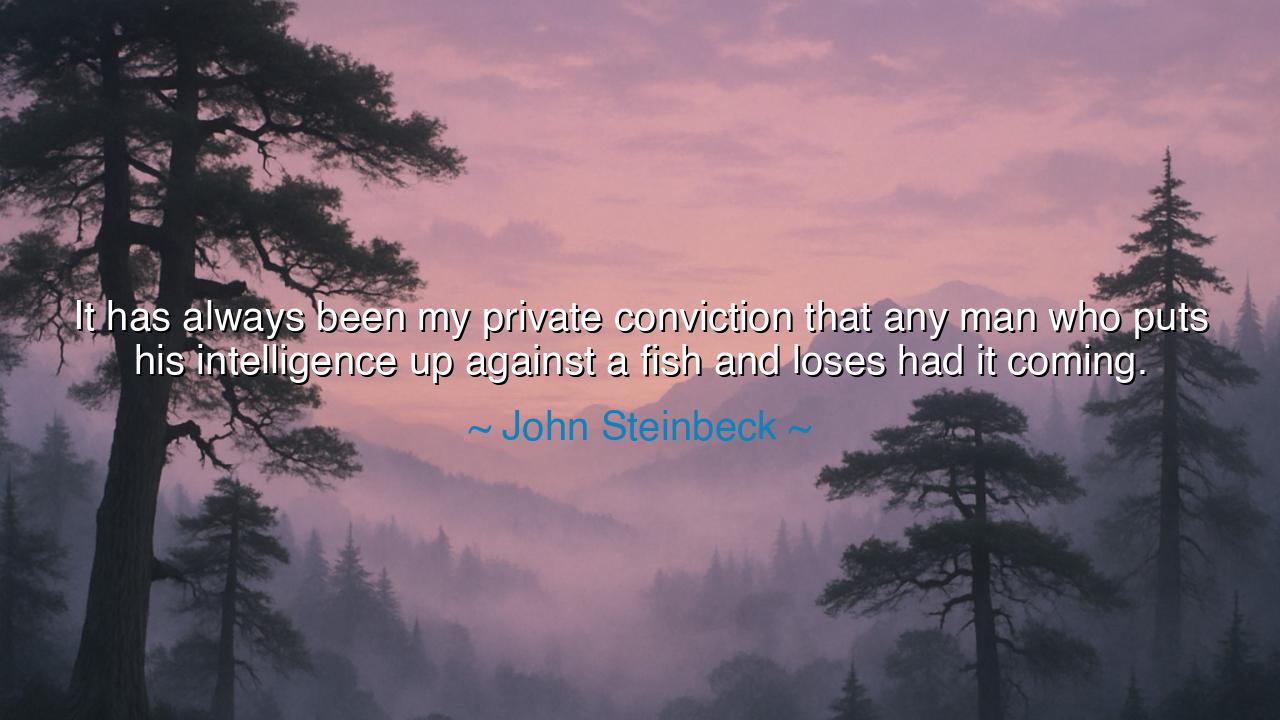
It has always been my private conviction that any man who puts
It has always been my private conviction that any man who puts his intelligence up against a fish and loses had it coming.






The words of John Steinbeck — “It has always been my private conviction that any man who puts his intelligence up against a fish and loses had it coming.” — shimmer with humor, yet beneath their wit lies a deep lesson about humility, overconfidence, and the limits of human control. Steinbeck, a man who understood both the nobility and foolishness of humanity, spoke often with laughter that carried truth. This line, from his classic work The Log from the Sea of Cortez, is not merely about fishing; it is a parable about the hubris of intellect, about how even the cleverest of men can be undone by nature, by simplicity, or by their own pride.
On the surface, Steinbeck’s words seem to jest — the image of an intelligent man bested by a fish is absurd, almost comical. Yet that absurdity is the very point. Intelligence, as humans wield it, often becomes a trap. We believe our minds grant us mastery over the world, yet we are humbled time and again by forces we barely comprehend. The fish, simple yet free, obeys no theory or strategy. It follows its nature. The man, armed with reason and calculation, tries to outsmart it — and when he fails, it is not the fish that has triumphed, but his own arrogance that has undone him. In this way, Steinbeck mocks not intellect itself, but the illusion of superiority that too often accompanies it.
To lose to a fish is to be reminded that intellect without humility is brittle. The fisherman who overthinks his craft, who believes his tools and techniques guarantee victory, has forgotten the spirit of the pursuit. He has turned what was meant to be an act of harmony into one of domination — and in doing so, he loses. The ancients would have understood this well. The Taoist sages taught that mastery comes not from conquering nature, but from aligning with it. To struggle against the current is to exhaust oneself; to move with it is to find strength in flow. The man who “loses to a fish” has forgotten this eternal law.
Steinbeck himself was a man of the sea and the soil, a lover of the wild world. In The Log from the Sea of Cortez, he and his friend Ed Ricketts recorded their journey of scientific exploration along the coasts of Baja California. But their study was not just of marine life — it was a philosophical voyage, a meditation on the relationship between man and nature. The fish, to Steinbeck, symbolized the mystery of life itself — a being that lives in its element without question, while man, forever restless, tries to understand and master what cannot be mastered. Thus, when a man loses to a fish, Steinbeck saw it as justice: a poetic balance restored between arrogance and reality.
History offers many examples of those who “put their intelligence up against nature and lost.” Consider the story of the Titanic, declared unsinkable by the finest minds of its age. Human pride proclaimed victory over the sea — but the sea had other plans. In one night of ice and darkness, all that engineering and confidence vanished beneath the waves. The lesson was the same as Steinbeck’s: no mind, however brilliant, can outwit the forces of nature when it ceases to respect them. The sea, like the fish, remains the great equalizer — humbling kings and scholars alike.
Yet Steinbeck’s humor is not cruel. It carries compassion, a recognition that failure is part of the human adventure. To be “outsmarted by a fish” is to be reminded of our place in the great tapestry of creation — not above it, but within it. The wise do not mock such defeat; they laugh at it, learn from it, and cast their line again. For in every failure lies the opportunity to rediscover wonder — to realize that not all things must be conquered, that some things are meant simply to be experienced, respected, and loved.
So, O seeker of wisdom, take this teaching to heart: do not let your intelligence become your blindness. When you face the mysteries of the world — in nature, in others, or in yourself — approach them not as a conqueror, but as a student. Remember that wisdom is not found in knowing everything, but in knowing when to yield, when to listen, when to laugh at your own folly. For as John Steinbeck teaches, if you ever find yourself outwitted by a fish, do not curse your defeat — smile, for you have been reminded of the most ancient truth of all: that the world is larger, wiser, and infinitely more wondrous than your mind can contain.






AAdministratorAdministrator
Welcome, honored guests. Please leave a comment, we will respond soon